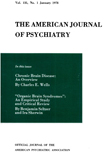PSYCHOLOGICAL FACTORS IN MEN WITH PEPTIC ULCERS
Abstract
Twenty men with peptic ulcers were studied from the psychosomatic point of view. None were psychologically mature. All of them had strong dependent desires which were secondary to either rejection or spoiling in early childhood. One group utilized the mechanism of overcompensation to deny these desires, resulting in the overt character picture of the driving, hard-working, ambitious business man. However, we found that the majority of our patients in a charity hospital were either outwardly passive and effeminate or openly acted out their deep oral desires. Ulcer symptoms developed in all of our patients as responses to frustration of these cravings, when the various defense mechanisms they used to handle such conflicts proved inadequate.
Access content
To read the fulltext, please use one of the options below to sign in or purchase access.- Personal login
- Institutional Login
- Sign in via OpenAthens
- Register for access
-
Please login/register if you wish to pair your device and check access availability.
Not a subscriber?
PsychiatryOnline subscription options offer access to the DSM-5 library, books, journals, CME, and patient resources. This all-in-one virtual library provides psychiatrists and mental health professionals with key resources for diagnosis, treatment, research, and professional development.
Need more help? PsychiatryOnline Customer Service may be reached by emailing [email protected] or by calling 800-368-5777 (in the U.S.) or 703-907-7322 (outside the U.S.).



